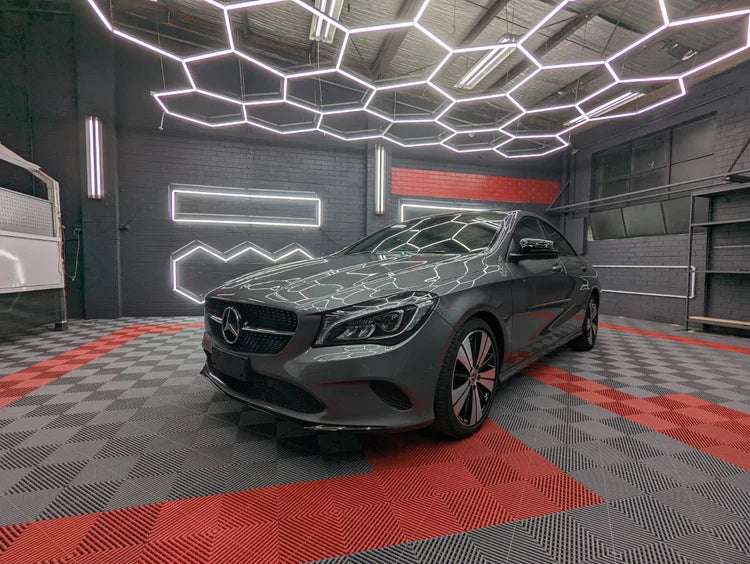How to choose which GTools garage floor tiles to use in your garage?
There are a few things to consider, do you want a simple DIY solution that you can do fast and easy then the square polymer interlocking floor tiles may be what you are looking for.
This type of tile is an easy DIY project that requires no special tools except a hand saw or jig saw to do the final edge, no glues, no epoxy, no waiting to cure, instant solution that anyone in the family can click together. They take the weight of a large 4WD with no issues.
We have 2 designs, a solid surface design that would good indoors and an open weave or vented design which is effective in both indoor and outdoor applications.
The solid surface tiles are easy to handle, simple to lay and very cost effective.

- These solid tiles are 10mm (H) x 305mm (W) x 305mm (L). Approximately 1 square metre = 11 tiles.
- Resists most automotive fluids and is 100% UV stabilised.
- Underside of tile has groves to drain any fluids away.
- Each tile can be easily swapped out if one gets damaged, without needing to pull up the whole floor. Just keep note of the direction you laid them down.
- Comes in a range of colours so you can be creative in your design - or not.
- Diamond reinforced structure will support the weight of cars, large 4WDs, trailers, bikes and more.
- Tiles can be cut to shape using a jigsaw, hand saw or table saw, to fit around any wall protrusions.
Ideal for interior use in garages, showrooms, kitchens, playrooms, sheds, offices, man caves, commercial areas, gyms and hangars.
Then there is the open weave or vented rib design, it is great in its appearance, is slightly larger at 400mm square and much thicker at 18mm height but it is also easy to handle, simple to lay and also very cost effective.

- These vented ribbed tiles are 18mm (H) x 400mm (W) x 400mm (L). Approximately 1 square metre = 6.25 tiles.
- Resists most automotive fluids and is 100% UV stabilised.
- Liquids will pass straight through the weave and drain away.
- Each tile can be easily swapped out if one gets damaged, without needing to pull up the whole floor. Just keep note of the direction you laid them down.
- Comes in a range of colours so you can be creative in your design - or not.
- The reinforced structure will easily support the weight of cars, large 4WDs, trailers, bikes and more.
- Tiles can be cut to shape using a jigsaw, hand saw or table saw, to fit around any wall protrusions.
Ideal for indoor and even outdoor garages, showrooms, kitchens, playrooms, sheds, offices, man caves, commercial areas, hangars, gyms and outdoors.
As durable as these types of polymer tiles can be, there are some considerations, and precautions that you need to be aware of.
Firstly, the solid top garage tiles are sometimes known to create some noise while walking on them. The hollow core underside construction can capture sound that bounces off the hard concrete underneath and cause a hollow click-clack effect.
This tends to happen more with uneven floors. If the tile is not laying fairly flat with the concrete, it will flex under a load before contacting the concrete surface. When it does, it can make the sound. The remedy for this is to lay down inexpensive underlay to absorb the sound prior to assembly.
Next is the issue of buckling or tenting of the solid tile floor when exposed to uneven direct hot sunlight for an extended period of time and or the installation has not allowed for sufficient expansion space. This is the one problem that gets the most attention, though occurrences are not very common. It is most conducive for solid top tiles when over exposed to the sun at or near an open garage door.
The reason for this is that plastic garage tiles expand and contract with temperature. This is why manufacturers require leaving a 10mm gap between the tile and any wall or permanent structure.
Solid top tiles exposed to direct sunlight for a period of time will absorb the heat and can expand faster than the rest of the floor. If they do not have enough clearance or if they are in the sun long enough, they run out of room for expansion and can buckle up.
A recommended solution is to use 2 rows of 305 series ribbed floor tiles at the garage entrance if excess sun heat is expected there.

Buckling due to incorrect installation or excess heat
On the other hand, the self-draining vented garage tiles are not nearly as susceptible to heat expansion as solid top tiles. This is due to much less surface area to absorb heat. In addition, the tops of the ribs are actually curved. As a result, only a small section of the curved rib is exposed to the most direct sunlight.
Which one to use, they are both good, just choose the finish you like but if going outdoor or they are exposed to an extended period of high heat from direct sunlight then the vented ribbed tile would be the choice tile.

